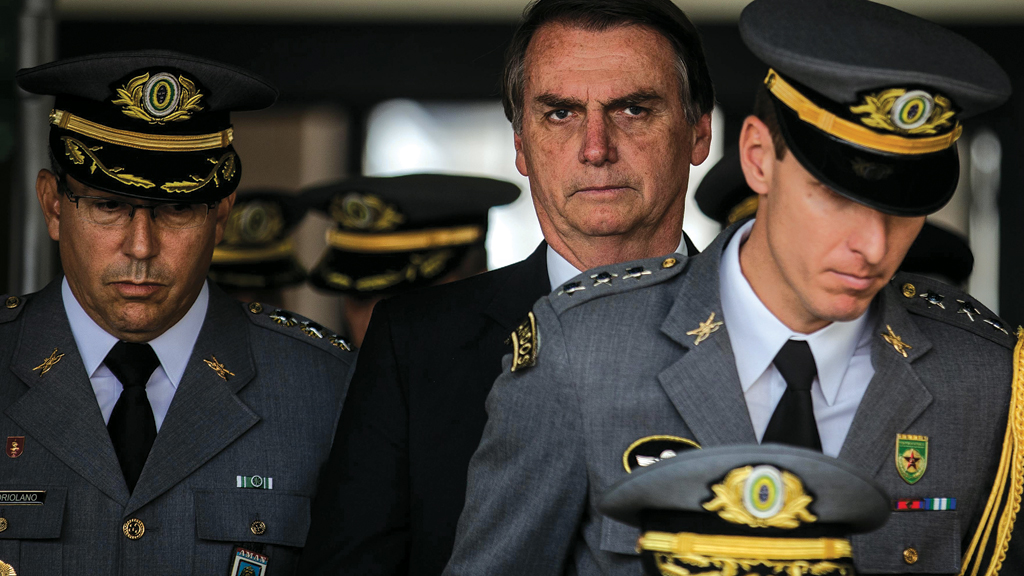RIO DE JANEIRO, BRAZIL – The majority of Brazilians reject the appointment of military officers to federal government positions, according to Datafolha.
A survey conducted by the institute on May 11 and 12 shows that 54% of respondents are against the presence of the military in these positions, compared to 41% who are in favor.

Five percent of respondents did not answer. The error margin is 2 percentage points plus or minus. Datafolha interviewed 2,071 people face-to-face all across the country, and the reliability level is 95%.
A year ago, the institute conducted the same survey, and rejection of the appointments also won: 52% said they were against the presence of the military in the government, while 43% were in favor.
President Jair Bolsonaro’s campaign pledge, the appointment of the military to ministries and other important positions, has reached levels unseen since the end of the military regime in 1985.
Bolsonaro, himself a retired army captain, currently has seven military ministers. Even purely political positions, such as the Government Secretariat, which organizes coordination with Congress, is held by a uniformed officer.
The Chief of Staff, currently led by Luiz Eduardo Ramos, a retired general, was once led by Walter Braga Netto, also a retired general and currently in charge of the Ministry of Defense. Ramos, Bolsonaro’s friend from his military training days, was recruited to the top level in 2019 while still an active military officer and head of the Southeastern Command.
On the one hand, the appointment of nominees from a branch that is typically well rated by the population met a demand from part of his constituency for changes in political practices.
On the other hand, it made up for the lack of suitable candidates from the president’s base, elected by a small party with few formal allies.
Thousands of military officers have filled positions in several areas of the state structure. A Folha report in March showed that at the top of 19 state companies linked to the federal government, there were 92 members of the Armed Forces – 10 times more than in 2018, during Michel Temer’s administration.
They are in positions as diverse as the heads of the Correios (postal service), Valec (state-owned railway infrastructure company), and Ebserh (Brazilian Company of Hospital Services), linked to the Ministry of Education. A general has also taken over Petrobras, and vice-president Hamilton Mourão is also a reserve officer.
During the electoral campaign, the president’s circle comprised uniformed officers, such as the now minister Augusto Heleno, of the Institutional Security Cabinet (GSI).
From the military perspective, there were benefits, such as a career restructuring plan and the maintenance of spending on Navy and Air Force projects.
The performance of military members, however, became less admired after the administration of Eduardo Pazuello at the Ministry of Health, which ended in March. An active duty general, he took over the health crisis after Luiz Henrique Mandetta and Nelson Teich, who had complained about the limited autonomy granted by the president.
Pazuello promoted the militarization of Health, aligned himself to Bolsonaro’s orders, and was ultimately affected by the delay in organizing vaccine purchases and production.
He is currently under investigation by the Senate’s Covid CPI (investigative committee) and in the inquiry related to omissions in the response to the crisis in Manaus, early this year.
During Pazuello’s administration, the military insisted that he should join the reserve, which would contribute to dissociate the Armed Forces from the government’s measures. At the time, Army Commander Edson Pujol said that the military should not be involved in politics.
Pujol eventually left his post in March, along with the heads of the Navy and Air Force, because of friction with the president. The joint resignations were the greatest military crisis in the country since 1977.
On the other hand, Bolsonaro has strengthened his ties with the military, also as a strategy to tackle the political crisis resulting from the management of the pandemic. The president has made statements referring to the institution as “my Army”.
A part of his supporters seems to be more inclined to this kind of statement. According to Datafolha, among respondents who rate the government as excellent or good, approval of the military’s presence rises to 75%.
Among men, those in favor total 46%. Regionally, support is higher in the South (44%) than in the Northeast (39%).
Among respondents who say they are “very afraid” of the virus, rejection of the military jumps to 61%. Respondents with higher education (58%), public servants (62%), and Lula’s voters (69%) also reported higher rejection.

